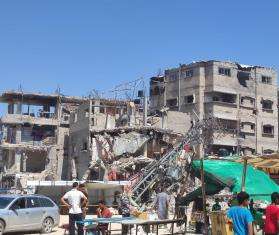A Doctors Without Borders/Médecins Sans Frontières (MSF) emergency team in eastern Democratic Republic of Congo (DRC)’s South Kivu Province vaccinated some 42,000 children and young people between six months and 15 years of age after authorities declared a measles epidemic in the region of Bunyakiri, where several confirmed cases had been recorded.
More than 150 people were mobilized for the campaign, including staff from MSF and the Ministry of Health (MoH) and members of the community. Workers were divided into ten teams grouped around the health areas of Bunyakiri, which saw the bulk of the vaccinations, and Tushunguti, an area that is particularly difficult to access and cannot be reached by any kind of vehicle. Teams went from house to house to ensure that the campaign reached as many children as possible.
The campaign took place over the course of almost two weeks, from May 24 to June 5. According to MSF estimations, at least three-quarters of the children and young people in the area targeted by the campaign were vaccinated.
“I was also vaccinated myself when I was younger, and I know it's something that is very important for children’s health,” said Faida, holding the hand of her one-and-a-half-year-old daughter, Lumoo, at the vaccination post in Bundengue.
MSF previously carried out a mass vaccination campaign in the region at the end of 2012, when a measles outbreak affected more than 700 children in Bunyakiri. MSF teams have regularly intervened since to help immunize the population, but routine immunization is not widespread enough to prevent new outbreaks. For example, in December 2014, more than 90,000 children and young people 15 and under were vaccinated in the region of Minova, near Bunyakiri.
Measles can be fatal in children if not treated, but it is very easy to prevent through vaccination. It is an extremely contagious disease that can cause complications such as pneumonia, malnutrition, severe dehydration, ear infections, and eye infections that can lead to blindness. Mortality rates vary considerably depending on the context, but when a population has not been vaccinated, measles can kill between 1 percent and 15 percent of the children it affects.
DRC has experienced measles epidemics for decades, and has seen a major resurgence of the disease since 2010. A study by Epicentre, MSF’s epidemiological research center, indicates that between 2010 and 2013, almost 300,000 cases were recorded in the country and more than 5,000 patients (1.7 percent of the total) died. According to the report, the number of cases dropped by more than 20 percent after the first vaccination campaigns.




